
Theofilos Mavropoulos was arrested two months ago after being wounded during an armed confrontation with two police officers (who also got their share) in northern Athens. He spent several weeks at Red Cross Hospital before being transferred to a prison hospital and then to A Wing at Korydallos Prison. Below is his first full-length open letter.
The rebel is a kamikaze—someone who simply won’t accept the fate the machine has dealt her. That’s how you seek a life worth living. Those who completely reject this society have already faced the risk of death head-on. The struggle against the existent is an armed farewell. War or suicide.
—People Collaborating to Achieve Negation (Toward the Outside)*
On May 18, 2011, a comrade and I accidentally bumped into a mobile police unit in the Pefki neighborhood. They wanted to stop us and we tried to run, but we got fouled up (a police officer pounced on my colleague and immobilized him while he was trying to escape). Thus, wanting to extricate ourselves, I made the choice—the political choice—of armed confrontation. Wanting to flee from democracy’s armed mercenaries, since we couldn’t allow ourselves to surrender without a fight, I myself decided to take that risk, giving my comrade—who was unarmed—a chance to escape. He did so successfully, using the police patrol car itself, but I was unable to because of my wounds.
The reason why my comrade and I didn’t stop for a police ID check was because we had consciously chosen revolutionary clandestinity—the final, obligatory choice of those who refuse to allow the “Law” to imprison them.
Being underground means living on the edge of a knife, making complicated choices, and assuming a high level of risk. “Legality” is therefore of obvious use to a revolutionary entity.
Nevertheless, for revolutionaries who reach the dilemma of “whether to surrender or not,” how easy or difficult it is to “sell your own skin” depends on your previous experience with disobedience. Like the case of the “robbers in black,” who just a few years ago chose freedom underground over arrest and imprisonment, and especially Simos Seisidis, who refused to stop for a random ID check and lost his leg to police gunfire. Examples like theirs, among others, fill all our hearts with pride and strength.
Right now, I define myself as yet another revolutionary anarchist political prisoner in the hands of the State. A State that, in view of the gestating possibility of social unrest, is tightening its hold on its subjects and directly or indirectly abolishing many of its democratic pretexts (doing away with telephone anonymity, requiring that citizenship papers be carried, putting prices on certain peoples’ heads, releasing photos of those in struggle and imprisoning some of them on the basis of completely insubstantial evidence, making it illegal to mask up, etc.)
However, these measures are incapable of intimidating the generalized war of conscience that is underway. A polymorphic war, here and now, continually developing toward the goal of demolishing the existent. A revolutionary war. Without a beginning, middle, or end, but with many fronts. From open public assemblies to fiercely combative marches, from armed guerrilla attacks to the little everyday occurrences that make us evolve on an individual and collective level.
But for the anarchist/antiauthoritarian movement to be effective against the methodical maneuvering of the enemy, is must not be divided. False friendships, personality conflicts, maliciousness, and especially tolerance and acceptance of such behaviors and attitudes have to be replaced by unity and continual rejuvenation within the anarchist/antiauthoritarian milieu. At the moment, of course taking into account attempts at an organized internationalization of subversive action from Latin America to Europe, that urgency is more necessary than ever.
Additionally, the fact that the number of political prisoners has quickly increased as of late leads us to several conclusions. Apart from the matter of our solidarity, which has depth and substance when it is interactive and attacking, we must stress the need for revolutionary forces to always be one step ahead of the enemy. Winning a war doesn’t just require will and certain essential abilities. It also requires strategy. When your adversary is moving her pawns, you should be moving yours as well.
The way each one decides to fight is an individual choice and responsibility. Accordingly, starting from the individual, it’s enough to simply collectivize the common desire to fight Power. Political stability certainly has its part, but it’s also important to attempt to subvert that stability in order to reach something better.
The spread of anarchist/antiauthoritarian ideas plays a key role. Intensifying it quantitatively as well as qualitatively is essential. Also, in war, losses are a statistical certainty. However, potential revolutionaries aren’t solely motivated by their undesirable origins in the lower social strata. The complex of capitalist relationships and perspectives so dominates everyone’s life that the “worst off” can be found within every social and economic class. When human life has become just another product on the shelves of the market and its marketing, what’s the point of talking about cheap or expensive products when anything and everything has its price? Among the impoverished and exploited classes, there will doubtless be sound revolutionaries, but there will also be submissives, plenty of submissives.
All of you watching your children happily enjoying themselves in playgrounds and schoolyards today shouldn’t be surprised when you see them forming revolutionary alliances or taking part in armed attacks on Capital and the State tomorrow.
Thus, with coherence and persistence, as well as inexhaustible fighting spirit, you can achieve many things. Degrees of reconciliation may be different, but the goal remains the same, whether it sprouts up at assemblies in university auditoriums or comes blasting from the barrel of a gun: REVOLUTION FIRST AND FOREVER.
My fingerprints were found at the apartment in Kallithea and the apartment in Nea Ionia in Volos. I can’t take historical and political responsibility for belonging to the Fire Cells Conspiracy revolutionary organization because we never created that organization’s political discourse together. I also had certain disagreements with that discourse. Therefore, I am very clearly stating that I was never a member of the Fire Cells Conspiracy revolutionary organization.
But in no instance did those disagreements obstruct the path we walked together. I and my comrades in the Fire Cells Conspiracy evolved side-by-side, learning from one another and then—now stronger—taking action from a revolutionary perspective for the cause of freedom.
For those reasons, I proudly declare that I was PRESENT at the apartments in Kallithea and Volos, and I was also present in the lives of the members of the Fire Cells Conspiracy.
Recognizing their revolutionary activity, I stand in solidarity with all the imprisoned members of the organization, and I send them my comradely greetings.
May the pamphlet The Sun Still Rises be the prelude to a new, more relentless, more destructive, and more unyielding cycle of attacks. Comrades, whatever the cost, we will keep our heads high.
HONOR TO ANARCHIST LAMBROS FOUNTAS, MEMBER OF REVOLUTIONARY STRUGGLE
SOLIDARITY WITH ALL POLITICAL PRISONERS
NO ONE WILL BE FREE UNTIL THE LAST PRISON IS DESTROYED
—Theofilos Mavropoulos; July 18, 2011; A Wing; Korydallos Prison
*Translators’ Note: This quote comes from a pamphlet published by four of our Thessaloniki comrades (Sokratis Tzifkas, Dimitris Dimitsiadis, Haralambos Stylianidis, and Dimitris Fessas) during their brief period underground (October 2010–January 2011) before being arrested for the arson of several Public Power Corporation (DEI) vehicles.
Grecia – Carta de Theofilos Mavropoulos
El compañero que quedó arrestado hace 2 meses, herido después de un enfrentamiento armado con 2 policías (los cuales también recibieron lo suyo) en norte de Atenas, al pasar varias semanas en el hospital “Cruz Roja” y luego en el hospital carcelario, fue recién trasladado a la ala A de Koridallos. Esta es la carta que publicó:
Carta de Theofilos Mavropoulos
“El rebelde es un suicida, uno que simplemente no acepta el destino que la maquina le había dado. Es como buscar a una vida que vale la pena vivir. Los que rechazan por completo a esa sociedad ya se han visto enfrentados al riesgo de la muerte. La lucha contra lo existente es un adiós armado.
Guerra o suicidio”
Colaboración de personas para realización de lo negativo (hacia fuera)
(extraído del folleto)*
El 18 de mayo de 2011 en zona de Pefki, yo y un compañero mio tuvimos un encuentro accidental con policías de brigada móvil. Quisieron pararnos, nosotros intentamos huir pero habíamos fallado (un policía se lanzó sobre mi colega y le inmovilizo, cuando ése intentó escaparse) y así, queriendo desenredarnos elegí la opción, la opción política de enfrentamiento armado. Queriendo huir de los pretores armados de la democracia y puesto que no pudimos permitir de entregarnos sin una batalla, yo mismo al decidir de arriesgarme de esta manera, ofrecí una oportunidad para el compañero mio, que no tenía arma encima, para que huyese. Lo hizo con éxito, utilizando el mismo coche patrulla, pero no yo pude seguirlo a causa de mis lesiones.
La razón por qué yo y el compañero no nos hemos parado en una control policial fue porque de manera consciente elegimos la opción de clandestinidad revolucionaria. La última y obligatoria opción de alguien que se niega que la “Justicia” le imponga el encierro.
La condición de clandestinidad supone una vida sobre filo de la cuchilla, cuando las opciones se están complicando y el riesgo sube de modo vertical. Por consiguiente se hace evidente la utilidad de “legalidad” para una entidad revolucionaria.
A pesar de eso, para los revolucionarios que llegan al dilema “entregarse o no”, lo cómo fácil o difícil sea “vender su propio pellejo” los deja un bagaje de experiencia en lo que se refiere a desobediencia. Como en el caso de los “atracadores de negro”, que hace ya bastantes años eligieron la opción de libertad clandestina en vez del arresto y encierro, y especialmente Simos Seisidis que, al negarse de parar en una control aleatoria había perdido su pierna a causa de fuego policial. Los ejemplos como el de ellos y no sólo ese, llenan con orgullo y fuerza los corazones de todos nosotros.
Ahora ya, me defino a mi mismo como un más anarquista revolucionario preso político en manos del Estado. Un Estado que a la vista de las posibles agitaciones sociales que se están incubando, aprieta las ataduras de sus súbditos, aboliendo de manera directa o indirecta muchos de sus pretextos democráticos (abolición del anonimato telefónico, carta del ciudadano, actos de poner precio a cabeza de unos, publicación de fotos de los que luchan, encarcelamiento de algunos de ellos a base de pruebas sin fundamentos ningunos, la ley de capucha…).
Tales movidas sin embargo no son capaces de intimidar a la generalizada guerra de consciencias que se está llevando a cabo. Una guerra polimorfica, aquí y ahora, en un desarrollo continuo y con el objetivo siendo el derrumbamiento de lo existente. Una guerra revolucionaria. Sin inicio, mitad ni fin, pero con muchos frentes. De las asambleas públicas y abiertas a las marchas fuertes y combativas, de los ataques armados guerrilleros a las pequeñas influencias de cada día que nos hacen evolucionar en el nivel individual y colectivo.
Pero, para que el movimiento anarquista/antiautoritario sea eficaz frente a las metódicas maniobras del enemigo, no debe de ser escisionado. Las falsas amistades, las vanidades individuales, las riñas personales, las malicias pero sobre todo la tolerancia y consenso con tales comportamientos y actitudes tienen que ser remplazadas por la síntesis y la continua renovación del ámbito anarquista/antiautoritario. En el momento en que desde luego se puede observar intentos de una organizada internacionalización de la acción subversiva, desde la América Latina hasta Europa, la urgencia esta es más perentoria que nunca.
Además, el hecho que el número de presos políticos en último tiempo había aumentado rápidamente, nos conduce a varias conclusiones. Aparte de la cuestión de nuestra solidaridad, la cual tiene sentido y esencia cuando sea interactiva y ofensiva, tenemos que proporcionar la necesidad que las fuerzas subversivas siempre sean un paso más adelante que el enemigo. Para ganar una guerra se precisa no sólo la voluntad y unas indispensables capacidades, pero también la estrategia. Cuando el adversario está moviendo los peones tú tienes que moverles también.
La manera en que cada uno elige de luchar es una opción y responsabilidad individual. Por tanto, empezando por el individuo basta con sólo colectivizar el deseo común por lucha contra el Poder. Por cierto que los equilibrios políticos juegan su papel, pero la importancia la tiene también el intento de subvertirlos para que salga algo mejor.
La difusión de las ideas anarquistas/antiautoritarias tiene un papel protagonista. Fortalecimiento tanto cuantitativo como cualitativo es indispensable. Además, en una guerra las perdidas son algo seguro, de acuerdo con estadística. Sin embargo, la motivación para un posible revolucionario ya no es sólo su, indeseable para él mismo, proveniencia de las capas sociales bajas. El complejo de las relaciones y percepciones capitalistas es tan dominante en las vidas de todos que los “perjudicados” se encuentran en todas clases sociales y económicas. Cuando la vida humana se vuelve un producto más en las estanterías del mercado y marketing, ¿qué sentido tiene hablar sobre productos caros o baratos, cuándo todo pero todo tiene un precio? Sin duda entre las clases degradadas y explotadas haya sanos revolucionarios, pero haya también sumisos, bastantes sumisos…
“Cuantos de vosotros ven hoy como sus hijos están jugando alegres en parques infantiles y patios de escuelas, que no se sorprenden si mañana los van a ver montando alianzas revolucionarias o tomando parte en ataques armados contra el Estado y el Capital”.
Pues, con coherencia y persistencia, como también con inagotable ánimo combativo se pueden lograr muchas cosas. El grado de reconciliación puede diferenciar. Si florece en las asambleas de anfiteatros universitarios o si se apaga en los cañones de armas, el objetivo queda lo mismo : REVOLUCIÓN PRIMERA Y PARA SIEMPRE.
…Mis huellas dactilares fueran encontradas en los pisos en Kallithea y en Nea Ionia de Volos. No puedo asumir la responsabilidad histórica y política de pertenencia a la organización revolucionaria Conspiración de Células del Fuego, porque jamás hemos creado juntos el discurso político de organización, discurso con el cual tengo además ciertos desacuerdos. Por lo tanto declaro muy claramente que nunca fui miembro de o.r. CCF.
Pero en ningún caso los desacuerdos estos habían estorbado a la marcha que hemos recorrido juntos. Junto con los compañeros de CCF evolucionamos, aprendimos uno del otro y luego, ya más fuertes, habíamos accionado por la causa de la libertad y de la perspectiva revolucionaria.
Por lo tanto, debido a estas razones declaro con orgullo que estaba PRESENTE en las viviendas en Kallithea y en Volos, estaba presente también en las vidas de los miembros de CCF.
Reconociendo su actividad revolucionaria estoy solidario con todos los encarcelados miembros de organización y les mando mis saludos compañeristas.
Que el folleto “El sol seguirá rayando el alba” sea el preludio de un nuevo, más implacable, más destructivo y más inexorable ciclo de ataques. Compañeros, cuál que sea el gasto seguimos con cabeza en alto.
HONOR AL ANARQUISTA LAMBROS FOUNDAS, MIEMBRO DE LUCHA REVOLUCIONARIA
SOLIDARIDAD CON TODOS LOS PRESOS POLÍTICOS
HASTA QUE SEA DESTRUIDA LA ÚLTIMA CÁRCEL NADIE ESTARÁ LIBRE
18 de julio 2011
Theofilos Mavropoulos
Ala A de la cárcel de Koridallos
*Nota de traducción: Se trata del folleto que han editado los 4 compañeros de Tesalónica (Tsifkas, Dimtsiadis, Tsilianidis y Fessas) durante su breve periodo de clandestinidad (octubre 2010-enero de 2011), antes de ser detenidos.
http://culmine.noblogs.org/post/2011/07/22/grecia-carta-de-theofilos-mavropoulos/



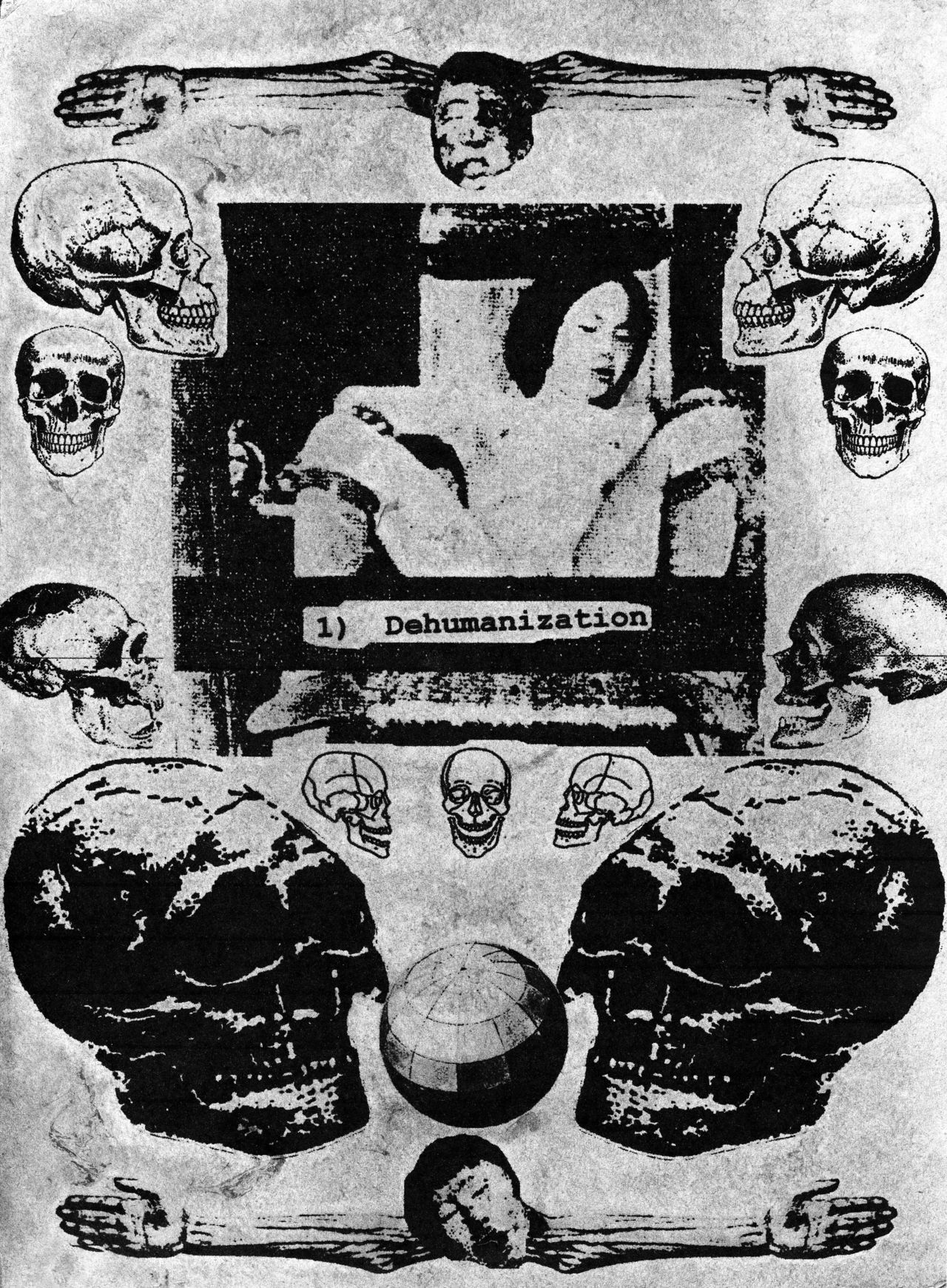



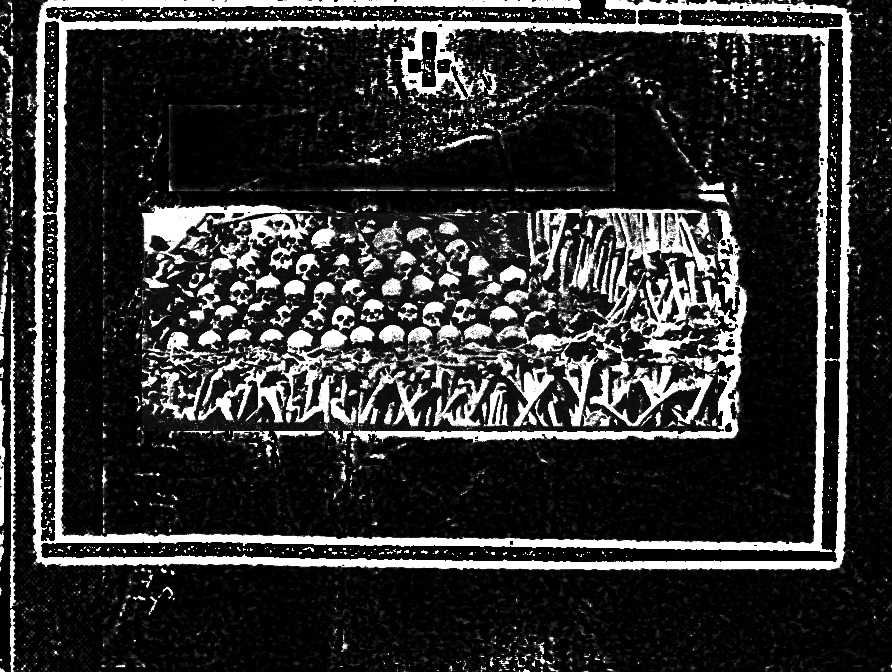
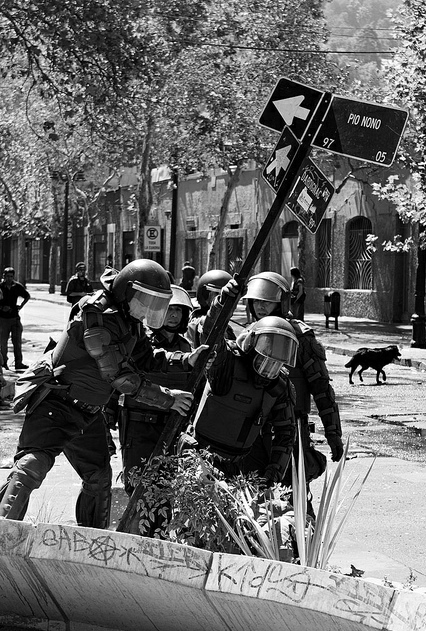
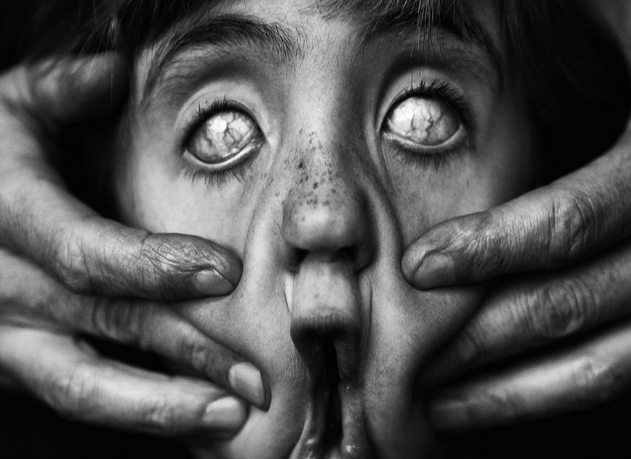


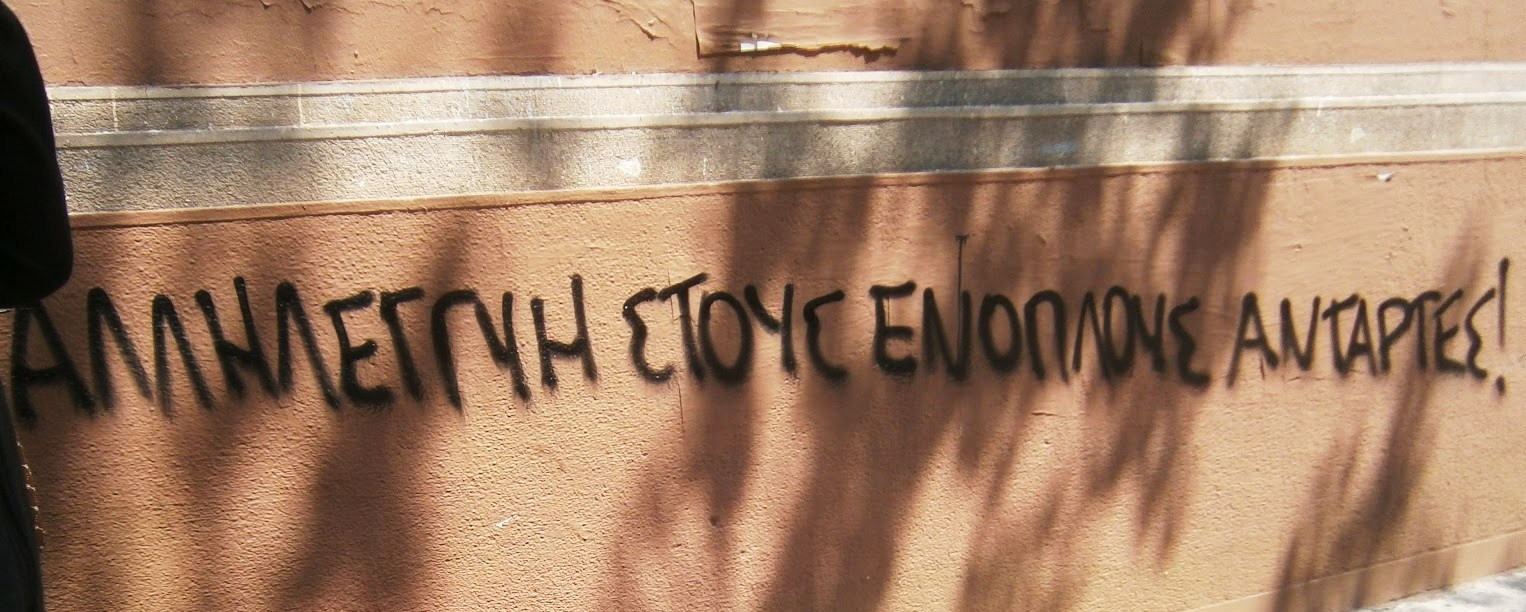

![Eurorepressione - Sulla conferenza a Den Haag sul tema "Anarchia" [corretto]](http://25.media.tumblr.com/tumblr_m0jvngOXtY1qa2163o1_1280.jpg)

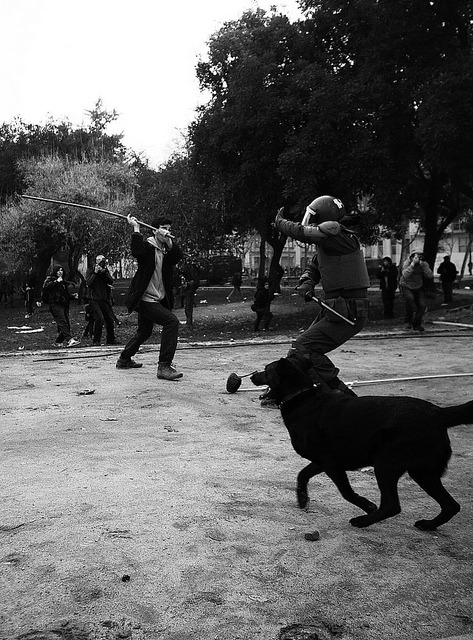
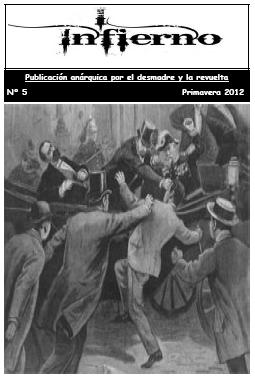
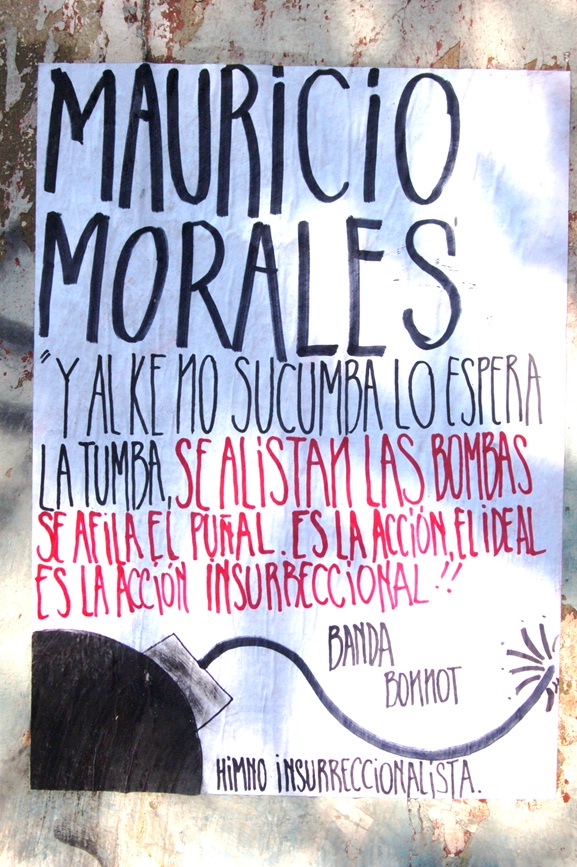
![A tres años de la Partida de Mauricio Morales: De la Memoria a la Calle [Stgo.]](http://metiendoruido.com/wp-content/uploads/2012/05/mmacividad.jpg)





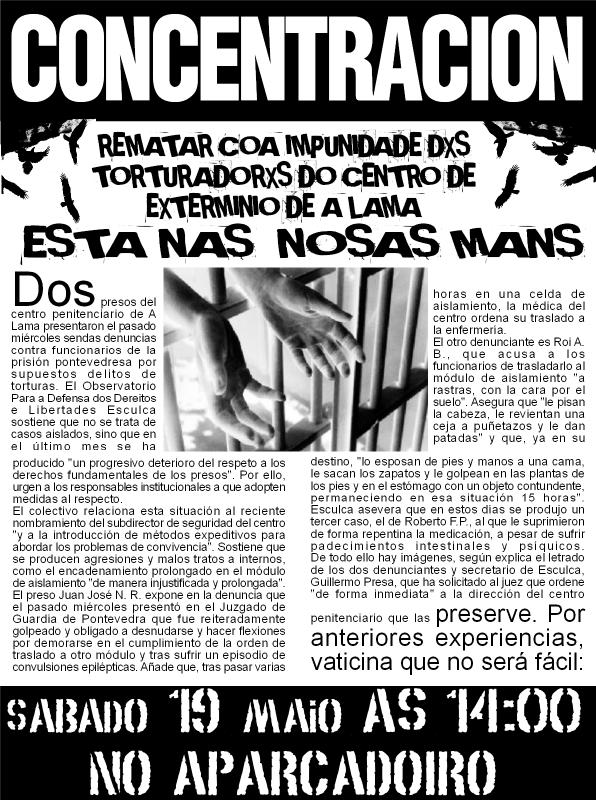

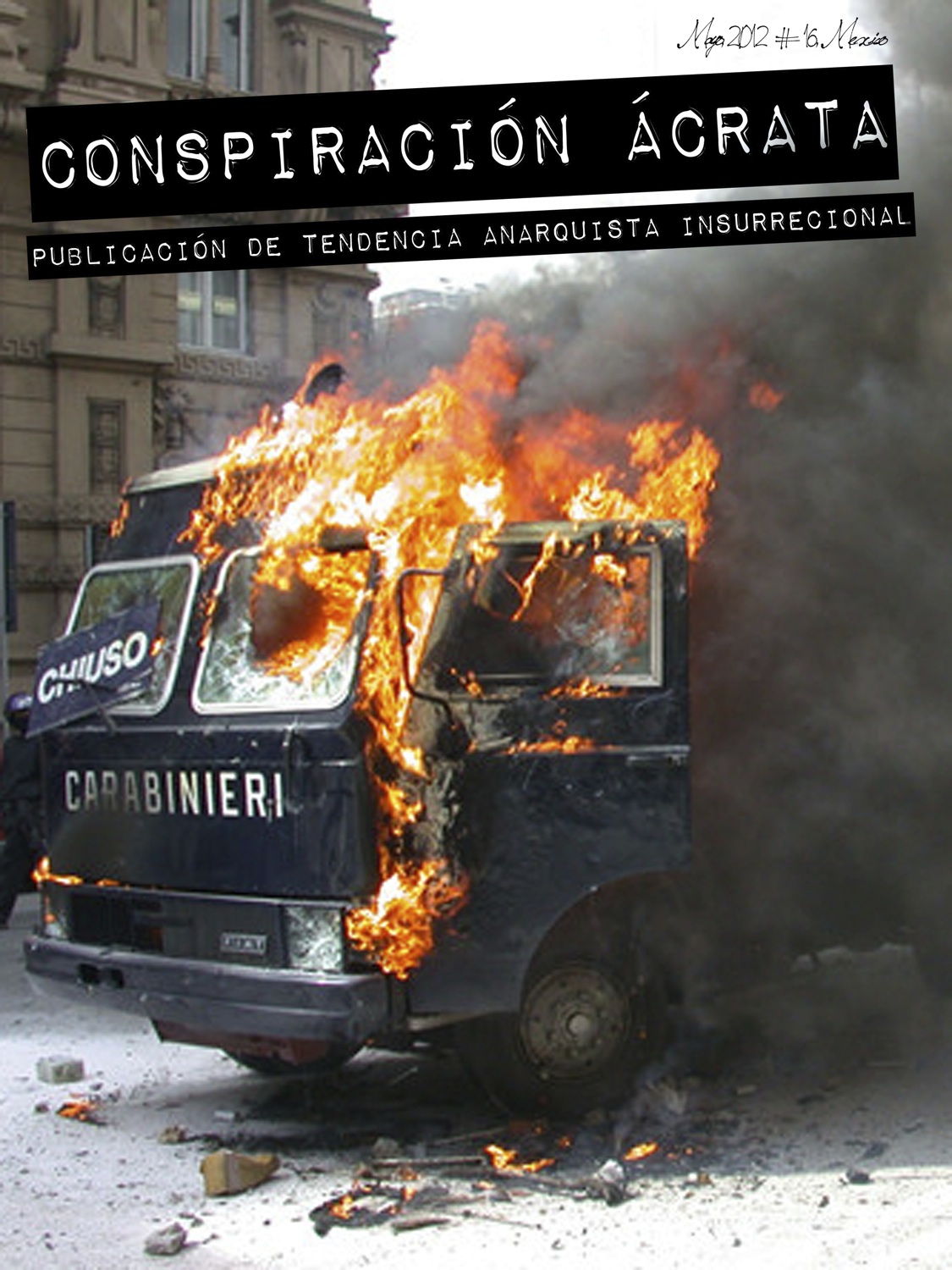

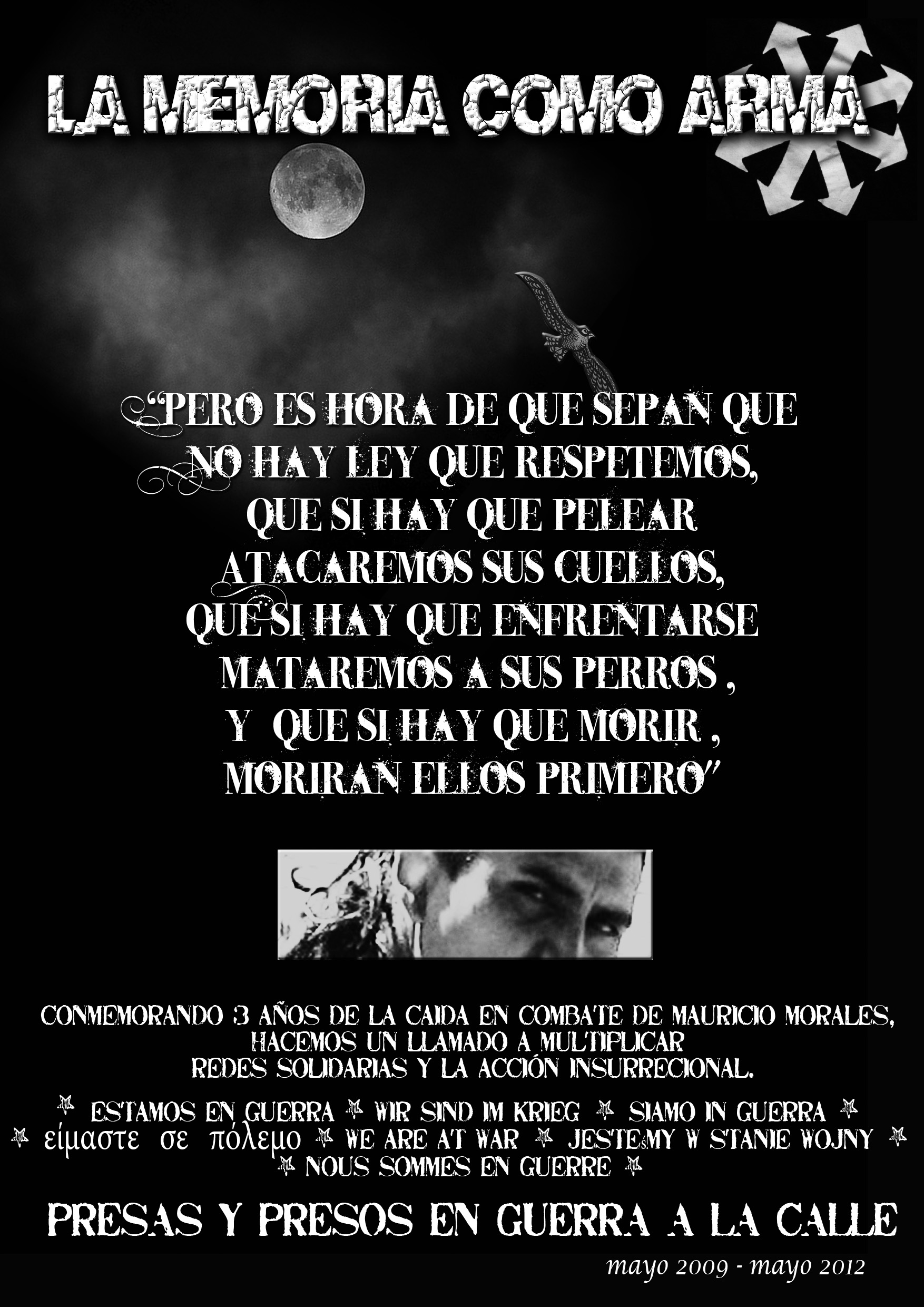
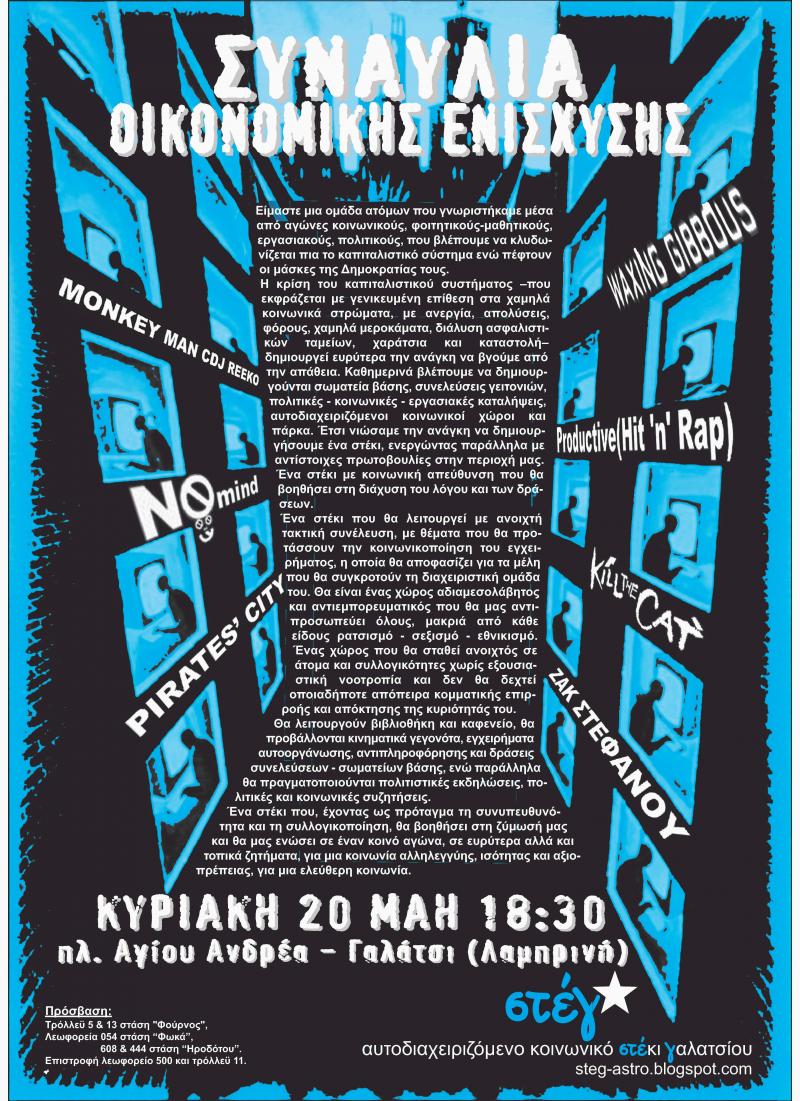








Nessun commento:
Posta un commento